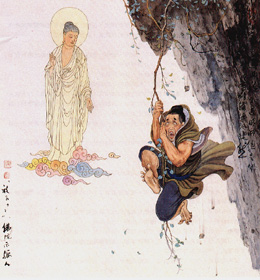The first step is to let go of the question. After all, when we hold on to questions such as these we are attached to them.
The matter is illustrated aptly by a painting found on the road between Taiwan's old and new Foguangshan Temples:

One day a man stepped out to run errands. On his way he passed a
cliff. Not paying attention to the road, he slipped and fell. Seeing
his life was in danger, he only just managed to grasp a branch sticking
out from the cliff wall. As he saw no way up or down, he was stuck.
Until out of thin air a Buddha appeared floating on a
cloud.
The man saw his chance and begged the being: "Please save me!"
"I can save you, alright." said the Buddha "but only if you listen
carefully and do as I say."
"Enlightened One, at this point how could I dare disobey you. I will
do whatever you say. I am listening." replied the man.
"Alright then" said the Buddha, "then let go of the branch you are
holding on to!"
Upon hearing these words the man's thoughts started racing. If I > let go, how could I ever survive the fall. My bones will surely be
shattered. How will this save my life?
Consequently, he held on to the branch all the more tightly.
The Buddha, observing this, left the man where he was.
If we want to see clearly, we must follow the Buddha's instructions and let go. At the cliff egde, you can save yourself by letting go. Otherwise, if we are desperately clinging on, how can we ever get out of danger.
Set aside your discrimination between concept and reality. Non-duality and non-discrimination are key. Stop thinking.
